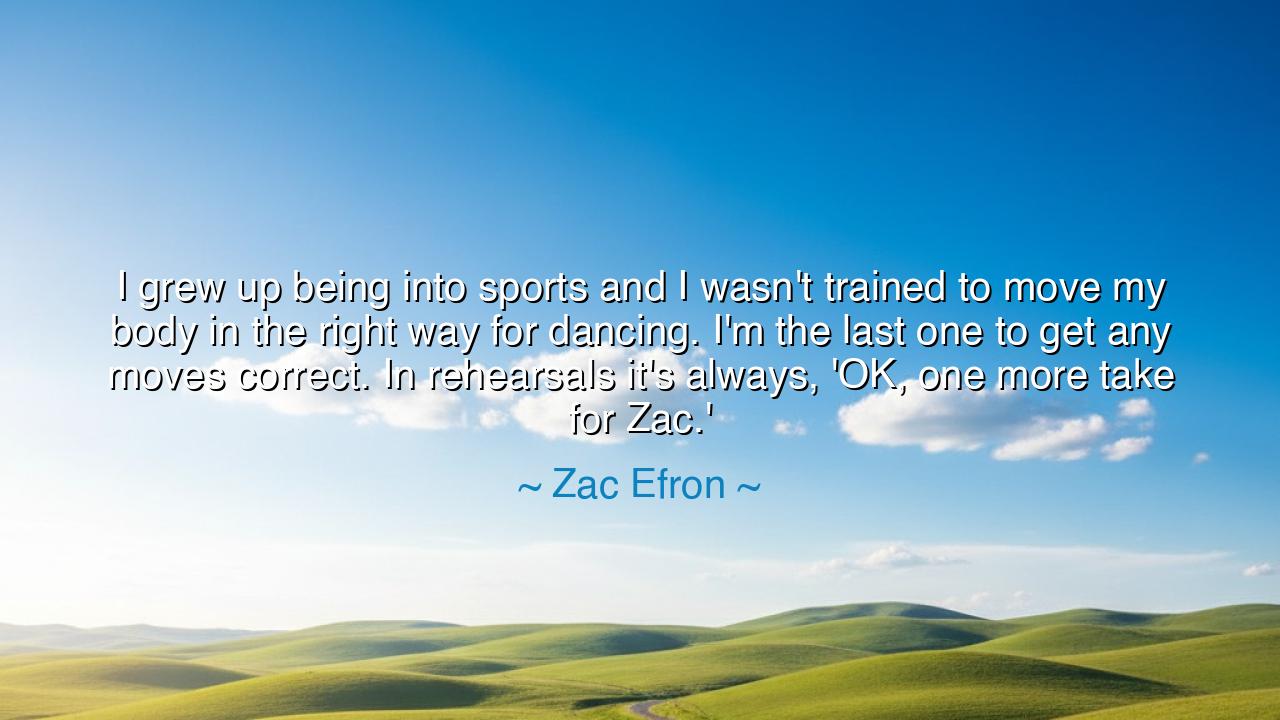
I grew up being into sports and I wasn't trained to move my body
I grew up being into sports and I wasn't trained to move my body in the right way for dancing. I'm the last one to get any moves correct. In rehearsals it's always, 'OK, one more take for Zac.'






The words of Zac Efron, though spoken with a note of humor and humility, contain a truth that reaches beyond the stage: “I grew up being into sports and I wasn’t trained to move my body in the right way for dancing. I’m the last one to get any moves correct. In rehearsals it’s always, ‘OK, one more take for Zac.’” What appears as a simple confession of struggle in dance is, at its heart, a meditation on the nature of discipline, transformation, and the courage to persist where one is weakest.
He begins with his upbringing in sports, where the body is trained for speed, power, agility, and endurance. In sports, movement is functional, purposeful, aimed at victory over an opponent or the breaking of a record. Yet in dance, movement is not only about utility but about beauty, rhythm, and grace. Here lies the tension of his words: the body trained for one field does not automatically master another. This truth reminds us that excellence in one arena does not guarantee ease in all others, and that greatness often demands humility when beginning anew.
Efron’s remark about being the last to get any moves correct speaks to the universal human struggle with learning. There is shame in being behind, in stumbling where others soar, in needing “one more take” while the group waits. Yet there is also courage here: to remain in the rehearsal, to attempt again and again, is the mark of resilience. In this, he embodies the truth that growth often begins in embarrassment, but triumph is born from persistence.
History reflects this lesson. Consider the life of Mikhail Baryshnikov, one of the greatest ballet dancers of all time. When he first fled the Soviet Union to join Western companies, he found his technique questioned and his style challenged. He had to retrain, relearn, and rebuild. Though already a master, he humbled himself to correction and emerged even greater. Just as the athlete must relearn for dance, so too did Baryshnikov transform through humility and perseverance.
Efron’s words also speak to the value of versatility. To step from the familiar world of sports into the foreign world of dance is to expand the soul. It is to accept that the body, though trained, can always be taught anew; that the mind, though disciplined, can always be opened further. It is a call to us all: never confine yourself to what you already know. Enter new arenas, stumble, and rise again. In doing so, you discover not only new skills but new dimensions of yourself.
The deeper meaning is this: mastery is not the absence of failure but the refusal to quit in the face of it. To be the last one in rehearsal, to hear “one more take,” is not defeat—it is the forge of resilience. The one who persists in weakness often gains more than the one who excels with ease, for he learns patience, endurance, and the courage to laugh at himself while still striving for excellence.
Therefore, children of the future, let Zac Efron’s words remind you: do not fear being the last, do not fear the extra take, do not fear the slow path. What matters is not how quickly you master the steps, but that you remain in the dance. Learn to embrace humility, for it is the soil in which greatness grows. And know this—whether in sports, in art, in study, or in life—the heart that refuses to give up will always rise higher than the one that never falters.
Thus his light-hearted confession becomes timeless wisdom: strength in one field does not excuse weakness in another, but courage in weakness creates true strength. And so, the one who is willing to stumble, to repeat, and to try again will not only learn the steps of the dance, but the greater rhythm of life itself.






AAdministratorAdministrator
Welcome, honored guests. Please leave a comment, we will respond soon